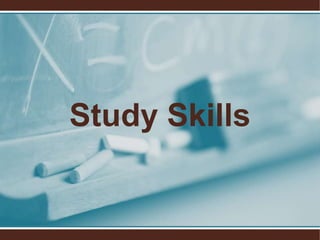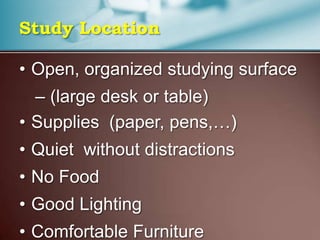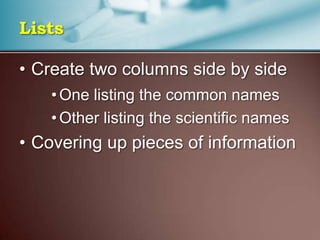Study skills
- 1. Study Skills
- 3. Ask someone to quiz you
- 7. Summarize
- 8. Outline
- 9. Graphic version of work (lists, columns, Venn diagrams…)
- 10. Quiz yourself
- 11. Rewrite Notes
- 12. Worksheet as a quiz by covering over the answers and re-doing
- 13. Look over old quizzes and assignments and correct
- 14. Answer study guide question
- 15. Teach itOpen, organized studying surface (large desk or table)Supplies (paper, pens,…)Quiet without distractionsNo FoodGood LightingComfortable FurnitureStudy Location
- 16. Be calm and patient with yourself as you reviewBeating yourself up will do no good.Try to open your mind as much as possiblePutting other things asideAvoid frustrationCalm Attitude
- 17. Take Good Notes & Pay Attention
- 18. Create two columns side by sideOne listing the common namesOther listing the scientific namesCovering up pieces of informationLists
- 19. Put one word/picture one sideDefinition on other sideFlash Cards (modified list)
- 20. AcronymsExampleHOMESEach of the letters in HOMES begins the name of one of the Great Lakes (Huron, Ontario, etc.)AcrosticExample"Please Excuse My Dear Aunt Sally“parenthesis, exponents, multiplication, division, addition, subtractionAcronyms/Mnemonics:
- 21. Hard subject/assignment firstA student who receives A's in his chemistry course may enjoy studying chemistry (and can still benefit from it, of course!) but if he is receiving C's or D's in math or English, then it is more pressing during the grading period to study those other subjects. Assess your strengths and weaknesses and distribute your time accordingly.Focus on most important first
- 22. Study groups allow the student to use other students to helpFill in missing gaps in notes or understandingIdentify with each other's problems in the learning processQuiz each otherTeaching someone else material helps you to learnTutoringWork with Others
- 23. Practice improves successPractice Essays










